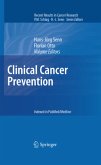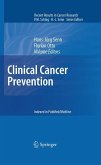This volume contains the main proceedings of the fourth international conference on "Cancer Prevention 2006," which was held during February 16-18, 2006, in St. Gallen, Switzerland. Written by international experts in the field, the book comprises a comprehensive update on the most recent developments in the upsurging fields of molecular biology and cancer genetics and their interactions with clinical epidemiology and cancer prevention at various levels: genetic/biologic predisposition and definition of high-risk groups; preclinical models and tumor prevention; prospects of surrogate endpoints and biomarkers; progress in imaging and detection of neoplastic precursor lesions; problems with Cox-2 inhibitors in tumor chemoprevention; primary and secondary prevention of gynecological, breast, gastrointestinal and genitourinary cancers. In addition, the future prospects of cancer chemoprevention are discussed.
From the reviews: "This is the volume 174 in the Recent Results in Cancer Research series. ... This is an international approach, with the considerably varied perspectives of the 75 authors. ... Cancer Prevention is useful for physicians in epidemiology and for oncologists who design and participate in clinical trials. ... Basic scientists (non-MDs) and graduate students in molecular biology, genetics, epidemiology, and public health may find this book interesting." (James R. Egner, Journal of the American Medical Association, Vol. 298 (1), July, 2007)








